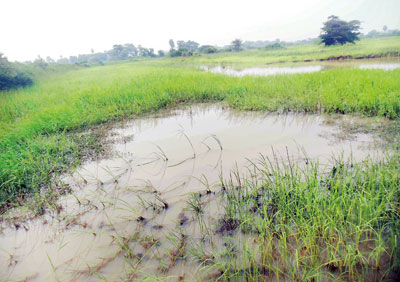News
Misery in Mannar for villagers who fled the clutches of terror

Uncertain future: The displaced are to be resettled close to this tank, but the people say they won't even be able to do any farming
There is no water to drink, no land to build homes, no jobs and very little hope. This is the situation facing hundreds of displaced people who returned to Mannar to find their lives have gone from bad to worse.
Many families fled Mannar in the Northern Province in fear of Tamil terrorism 26 years ago to Puttalam, but they came home to find hopelessness, they say.
A visit to the village Silawathura in the Musali division reveals the extent of their problems. In Musali, there were 3,044 families made up of 13,215 people in 1990, but now the number has swelled to 53,700 people.
Bakery owner, Mohamed Haneefer, 62, fled in fear of Tamil terrorists, who had ordered people to leave within a day in 1990. “I owned the Silawathura Ramshan Bakery and the Hotel. For 20 years until 1990, I supplied bread to the army camps. There were about 10 people working for me. I had a big house with five rooms.
“In 1988 and 1989 both the army and the LTTE began building camps. In the meantime, two youths related to us were killed. Fear crept into our minds. In 1990 the LTTE ordered us to leave within 24 hours,’’ he recalls.
Resident, Abdul Mohamed 46, said: “I was living on a land of 15 perches at the time when the LTTE ordered us to leave. We could take only a bag of clothes. People flocked to the jetty. One mother was weeping … her 3 year old child had fallen into the sea. When we reached Puttalam, the Muslims,Tamils, and Sinhalese all of them welcomed us.’’
Aziz Raheemi aged 55, who was also displaced, said that in 2009, only the males went in 37 boats to see the lands. They could only see the navy camp set on 30 acres land with three mosques, post-office and the courts building.
Fareed Mohamed 38, an official of the mosque said that in 1990 only 200 families left Silawathura, but now there are more than 700. Of these, 181 families had been allocated houses. “About 319 families have land, while 200 families still have no land.’’
Residents say water is the biggest problem. The local council hauls water from 15 miles away. Residents have paid Rs. 2,500 for a connection and pay Rs. 500 a month for water.
At a meeting in 2010, the then governor of the Northern Province had proposed 80 perches of land each for cultivation for people who left the village. But they got only 20 perches of land each.
Another issue that worries people is the Periya Nochchikulam Tank that provided water for the cultivation of150 acres of paddy. It has been filled up and construction is taking place.
Fishing is the main occupation of villagers in Silawathura but the harbour area has reduced to half an acre from 4 acres in 1988. No compensation has been paid for the area taken over.
Two widows are also waiting for compensation for the deaths of their husbands. One of the men killed by the Tamil terrorists was Senul Abdin, former chairman of the Musali Rural Development Council. He was killed on his way home from the kovil.
Segu Jamil Wahida Bibi, now 58, a social worker, was also among those who left in 1990 and she returned in 2010. She started a women’s organization involving 15 villages.
Secretary to the Musali Rural Council, Sundaram Sudhaharha, says water is being provided to 10,650 people in 30 villages. Water is transported from a tank 27 kilometres away.
As for joblessness, the Assistant Divisional Secretary of the Musali Division, N A P S Wickremasinghe, says industries should be set up on a 25-acre land in Musali.

